Accreditation
Accreditation of eXcorLab GmbH
 To meet the demands of our customers eXcorLab GmbH has established a quality management system which complies with the requirements of EN ISO/IEC 17025:2018. 2009 our organization has been accredited by DAkkS (Deutsche Akkreditierungsstelle GmbH), the responsible authority in Germany, as a calibration and testing laboratory.
To meet the demands of our customers eXcorLab GmbH has established a quality management system which complies with the requirements of EN ISO/IEC 17025:2018. 2009 our organization has been accredited by DAkkS (Deutsche Akkreditierungsstelle GmbH), the responsible authority in Germany, as a calibration and testing laboratory.
Our accreditation covers
- Optical Detection Techniques (Photometry / Fluorimetry / Light scattering techniques / Flow cytometry)
- Ligand assays (ELISA)
- Chromatographic techniques (HPLC, SDS gel electrophoresis)
- Physico-chemical techniques (determination of blood gases, electrolytes, pH, haematocrit)
- Cell counting using automated cell counters
- in vitro cytotoxicity
Our certificate may be viewed and downloaded here: Accreditation eXcorLab
Our quality management system, our techniques and methods are constantly evolving. We encourage all our employees to actively participate in this ongoing improvement process.
 Many countries worldwide have an organisation which is responsible for the accreditation of laboratories. Most of the national accreditation bodies use EN ISO/IEC 17025:2018 as the basis of accreditation of testing and calibration laboratories. Accreditation bodies from about 60 countries (including the EU, USA and Japan) signed a contract, to accept accreditaion of a laboratory in one member state as if the accreditation was issued in another country.
Many countries worldwide have an organisation which is responsible for the accreditation of laboratories. Most of the national accreditation bodies use EN ISO/IEC 17025:2018 as the basis of accreditation of testing and calibration laboratories. Accreditation bodies from about 60 countries (including the EU, USA and Japan) signed a contract, to accept accreditaion of a laboratory in one member state as if the accreditation was issued in another country.
